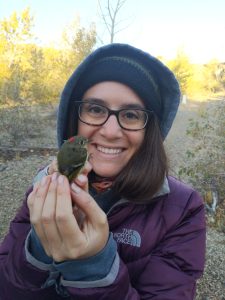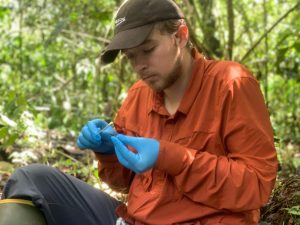Meet the team that works together to create programs like the KBS K-12 Partnership, Exploring with Scientists and more! Our focus is to share science in meaningful ways with K-12 educators, students and families. Read on to meet Elizeth, Kyle and Robin, the 2022 Science Education and Outreach Fellows at Kellogg Biological Station:
Elizeth Cinto Mejía
Hi! I am a Ph.D. candidate in the entomology department at Michigan State University. Although my lab is located on the main campus in East Lansing, I move to KBS every summer to do my research. I am very interested in the impacts humans can have on ecosystems. Before coming to MSU, I studied the effects of noise pollution on bird communities in the desert at Boise State University in Idaho. At MSU, I am focusing on how extreme weather events, specifically heat waves, alter plant communities. For this project, I mostly measure plant traits, physiology and plant diversity. Although now I am working mainly with plants, in the past I have worked with corals, birds, rodents, fish, bats and insects.
This is my second year as an outreach fellow and I am very excited to continue my work as an outreach educator. One of my favorite things about doing my Ph.D. has been interacting with students and K-12 teachers and families. I’ve had the opportunity to work with teachers not only in Michigan but across the US. This year, I want to keep working with the educators I have built connections with, but also come up with new outreach programs as well as keeping Spanish (my first language) as a main component of my work. I also look forward to the bilingual blog posts I will post with the Kellogg Bird Sanctuary; make sure you check them out!
Website: https://elizethcinto.wixsite.com/website
Kyle Jaynes
Hello! I am a Ph.D. candidate in the Department of Integrative Biology at Michigan State University. Although I am based year-round at Kellogg Biological Station, I do research in a lot of different places, much of which is international work. I am interested in understanding species persistence through global change, and I mostly work with amphibians and reptiles.
Before coming to MSU, I earned a bachelor’s degree in biology from Adrian College, where I worked closely with the Smithsonian’s National Museum of Natural History for the research component of my degree. I studied African Giant Tree Frogs, and showed that climate, physical barriers, and reproductive traits contributed to their diversification. At MSU, I’m working with highly endangered toads from South America to understand how some species have persisted through a disease outbreak, while others have gone extinct. I’m integrating DNA techniques, fieldwork, and lab experiments to try and answer these questions.
I’m very excited and consider it a privilege to be a second-year outreach fellow with the KBS outreach team. Disseminating my research is one of the most important parts of my job, whether that is publishing my work in a journal for other scientists to read, or having an informal conversation with a non-scientific audience. I’ve really enjoyed working with K-12 teachers during my time, in part because I did not have great K-12 science experiences when I was in school. The teachers we work with are inspiring! I’ve learned a lot from a completely virtual fellowship due to COVID-19, and am excited to integrate both virtual and in-person programs in my second year. In year two, I’m developing and implementing materials on biodiversity, conservation, and careers in biology. I’m hoping to reformat existing materials for different audiences and platforms, and better integrate evolution into these programs, which is another topic of interest for me. Stay tuned!
Website: https://kylejaynes.weebly.com
Robin Waterman
I am a second-year Ph.D. student in the Conner Lab at MSU’s Kellogg Biological Station. I am broadly interested in how organisms adapt to new environments. The two primary routes that populations can take to achieve adaptation are evolved genetic change across generations (termed “local adaptation”) and trait changes in response to the environment within a generation (termed “phenotypic plasticity”). I study both routes to adaptation in my research, using annual agricultural weeds as model systems.
My undergraduate and master’s research at Wesleyan University focused on the effects of light and competition on phenotypic plasticity in a common smartweed species. At MSU, I have one project investigating the impact of floral traits in wild radish on fitness and pollinator interactions. My other project will combine field, greenhouse, and genomic data to examine adaptation to crop fields in three native annual weeds.
My prior experiences in outreach and education have primarily been in the areas of climate justice, K-12 gardening, and sustainable food. I am very excited to be an Outreach and Education Fellow this semester, both for the chance to contribute to KBS’s efforts in these areas and to build my science communication skills. During my fellowship, I am particularly interested in science outreach to farmers and inclusive teaching, but I am also open to working on projects in a variety of areas.
Twitter: @RobinWEcoEvo
About the fellows program
The Science Education and Outreach Fellowships are funded by the MSU Graduate School in order to support KBS-affiliated graduate students in building science communication skills for broad audiences. Misty Klotz, KBS community outreach coordinator, and Kara Haas, KBS LTER K-12 Partnership coordinator are co-mentors to this experience.
More information
Are you a teacher interested in the K-12 Partnership? Send us an email.
Are you a KBS graduate student interested in this program? Find more information here.

A legacy of conservation; a commitment to sustainability.
3700 E. Gull Lake Drive
Hickory Corners, MI 49060
(269) 671-5117
info@kbs.msu.edu